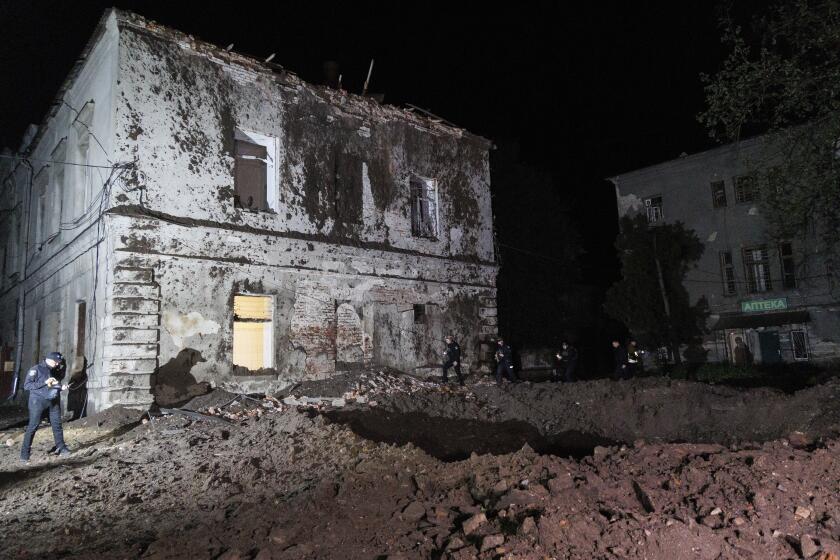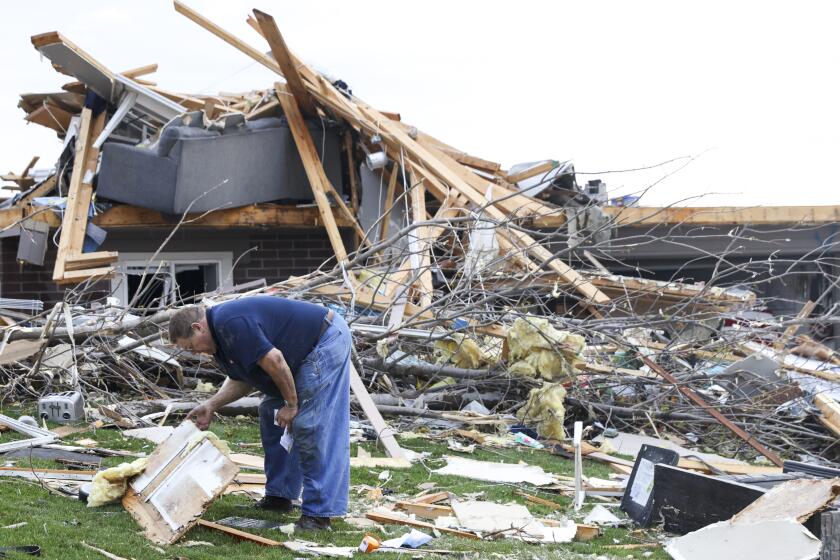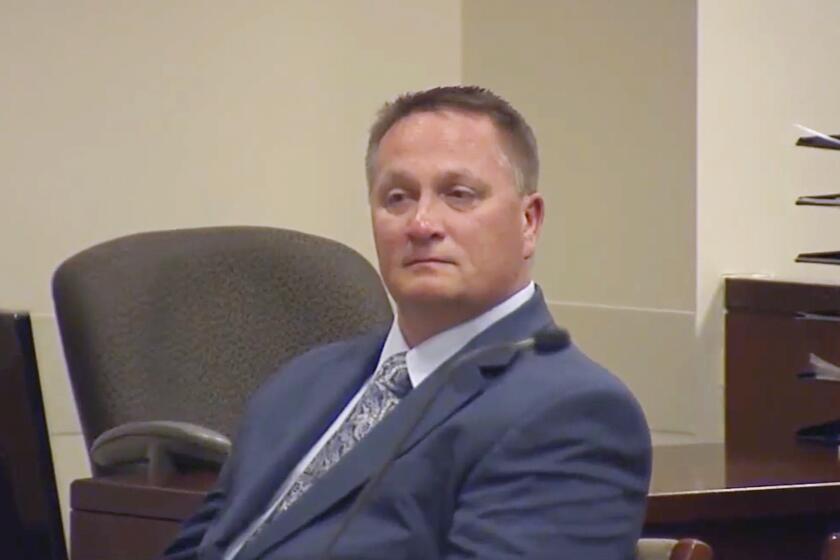Russian newspaper quite a story itself
One of the computers on reporter Vyacheslav Izmailov’s desk is more than a decade old, an antique by high-tech standards. But he refuses to part with the machine: Mikhail S. Gorbachev paid for it with his 1990 Nobel Peace Prize money.
“It is pretty outdated and not of much practical use anymore, but I will never throw it away,” said Izmailov, the military analyst for the fiercely independent Novaya Gazeta newspaper. “It is a little monument to freedom of speech and freedom of the press. And of course to Mikhail Gorbachev.”
When Novaya Gazeta, or “New Newspaper,” was launched in 1993 with a little help from the last Soviet leader, it soon won respect for its coverage of subjects such as corruption and the misdeeds of Russian forces in war-torn Chechnya. It also made powerful enemies.
Today, as Russian media increasingly come under the influence of the Kremlin, the thrice-weekly Novaya Gazeta, which claims circulation of nearly 700,000, stands out ever more as a lonely bastion of independent critical reporting.
“Novaya Gazeta is trying to tell people the real truth about the situation in the country and about the ways this country is managed by the people sitting in the Kremlin,” said Lyudmila Alexeyeva, chairwoman of the Moscow Helsinki Group, a prominent human rights organization. “I trust them like no other newspaper in Russia.”
Gorbachev said recently that he helped the newspaper get started because he knew and respected the journalists who launched it. He is still the publication’s patron saint. Last year he teamed up with billionaire politician Alexander Lebedev in a multimillion-dollar deal to rescue the newspaper in exchange for a minority stock interest.
In a recent report, the New York-based Committee to Protect Journalists described Russia as one of the 10 countries that had seen the greatest deterioration in press freedoms during the last few years. As an example, it cited a new law that defines illegal “extremism” to include “public slander toward figures fulfilling state duties.”
Though Novaya Gazeta’s heart lies with critics of Russian President Vladimir V. Putin, it is willing to blast what its writers see as failures of opposition politicians as well, particularly targeting what it perceives to be errors committed in the effort to build greater democracy in Russia.
“We are not an ‘opposition newspaper,’ ” Deputy Editor Sergei Sokolov said. “It so happens that our moral principles and our convictions are in opposition to the current authorities. But this is not a political position. This is a moral position....
“We say, ‘Guys, maybe you’re right doing those reforms. But why are you lying to us? Why are you stealing?’ ”
Putin, whom critics blame for tightening control over Russian media, and Lebedev, whose money provides for the survival of the newspaper most consistently critical of top authorities, are both former KGB foreign intelligence agents.
Lebedev argues that his KGB past in no way conflicts with his current promotion of democratic values, and that KGB foreign intelligence made a particularly great contribution to the Soviet Union’s shift to reform and openness -- perestroika and glasnost -- during the Gorbachev years.
“In a sense I’ve got nothing to feel remorse for, because every country has to have good foreign intelligence, so that even the old guard in the Politburo are properly informed,” he said.
“So I’m laughingly talking to Gorbachev, and I received permission to say, ‘It was the Russian foreign intelligence that was the No. 1 force in bringing up perestroika, rather than Gorbachev. He’s in the second place.’ And he said, ‘OK, you can tell it.’ ”
A member of the pro-Kremlin United Russia party, Lebedev is generally seen as something of a maverick -- relatively independent and democratically minded. He has said he plans to run for reelection to his seat in the lower house of parliament on the ticket of another recently created pro-Kremlin party, Fair Russia.
Lebedev and Gorbachev generally distance themselves from the newspaper’s criticism of Putin, saying that what they are supporting is democracy, not an anti-Kremlin line.
Speaking at a recent news conference called mainly to discuss an election-monitoring organization that he and Lebedev also support, Gorbachev said the two men were determined to see the newspaper survive.
“I think Novaya Gazeta is an honest newspaper,” Gorbachev said.
During the bitter 1996 presidential campaign, Novaya Gazeta won credit among well-educated and democratically minded readers for its effort to cover both sides fairly. Nearly all print and television media took sides in that battle, most siding with incumbent President Boris N. Yeltsin and some backing his challenger, Communist Party leader Gennady A. Zyuganov.
The newspaper drew global attention last year when its star reporter on Chechnya, Anna Politkovskaya, was gunned down in her apartment building. The apparent contract killing remains unsolved. She was the third journalist at the newspaper to be killed in apparent connection with their work or to die in suspicious circumstances.
Novaya Gazeta specializes in blunt talk that goes against the grain of what most Russian media are saying.
In recent weeks, for example, Russian politicians have fiercely complained about a decision by the former Soviet republic of Estonia to move a monument to Soviet fighters and the bodies of unknown World War II soldiers from central Tallinn, the capital, to a military cemetery. Ethnic Russians in Estonia had viewed the statue as a symbol of victory over Nazism, whereas many ethnic Estonians considered it a reminder of Soviet occupation of their country.
Nearly all Russian media adopted a harshly nationalistic tone on the issue.
But not Novaya Gazeta. It wrote that while Russian politicians were condemning Estonia’s actions, soldiers’ graveyards in Russia suffered from neglect or were being destroyed by “cynical investors who want to free up land spots for construction.”
The message to those complaining about Estonia, said Dmitry Muratov, the newspaper’s editor, boiled down to this: “When you are fighting the West, you are patriots, but when it concerns our citizens’ lives and deaths, it is not interesting.”
Novaya Gazeta’s readers, who tend to be a pro-Western slice of Russian society, appreciate that kind of stance.
“I almost never watch news on television because they never tell you the truth, or more precisely, the complete truth,” said Sergei Golovanov, an interior designer who has been a loyal reader since the mid-1990s, when he was attracted to the newspaper by its reports about Chechnya.
“So like in a desert where most water wells and fountains are poisoned,” he said, “I know my path to a fresh water source, probably the only one on a huge territory: I go to a kiosk and buy Novaya Gazeta.”
Advertisers, however, appear to have been frightened away by the newspaper’s anti-establishment politics, and the publication is a big money-loser.
Until last year, Novaya Gazeta had been totally staff-owned. After considerable soul-searching, the journalists sold a 10% stake to Gorbachev and a 39% stake to Lebedev, keeping a controlling 51% for themselves.
Lebedev said he put $3 million to $4 million into Novaya Gazeta last year, which helped it boost reporters’ salaries, pay off debts and increase to three issues per week from two. Looking to the future, he expects to subsidize it at the rate of about $350,000 a month and possibly put in more money to boost circulation, go to five issues a week, expand the use of color and hire more journalists, he said.
The new shareholders, both sides say, agreed that they would not try to influence editorial content aside from having the right to have their letters published criticizing stances taken in the newspaper. Lebedev writes fairly often.
The newspaper’s coverage of the Estonia controversy became one such case, Muratov said, with Lebedev publishing a letter taking a more critical stance on Estonia.
“When Lebedev began to publish his own opinions, many in the collective began to raise concerns,” said Sokolov, the deputy editor. “But I think we have no better plan of how to prevent shareholders from meddling into editorial policy, other than that they write their own articles. It’s quite a civilized approach, because people bought a huge headache with huge money.”
Lebedev said that despite disagreeing with Novaya Gazeta’s approach to some issues, he considers it his “civic duty” to support a newspaper with an independent point of view because Russia has so few of them.
“I don’t want to find myself back in the Soviet Union. I really didn’t like it,” said Lebedev, who speaks fluent English and was stationed in London for the KGB as a young man. “I want to have an illusion that we’re living in a different society, more open, and I need Novaya Gazeta in that sense.”
*
Times staff writer Sergei L. Loiko contributed to this report.
More to Read
Start your day right
Sign up for Essential California for news, features and recommendations from the L.A. Times and beyond in your inbox six days a week.
You may occasionally receive promotional content from the Los Angeles Times.






